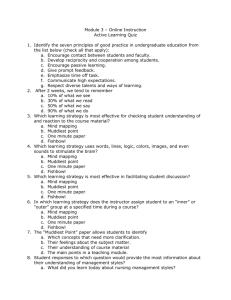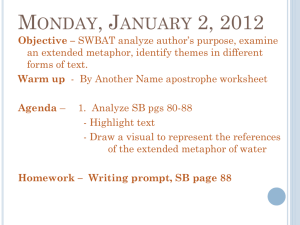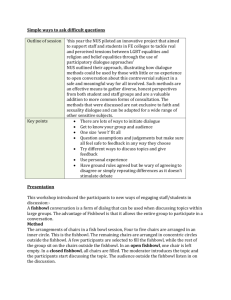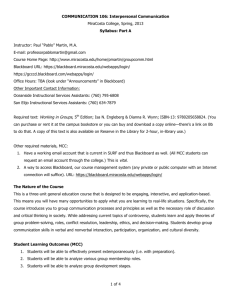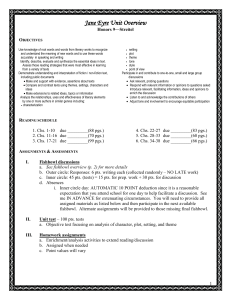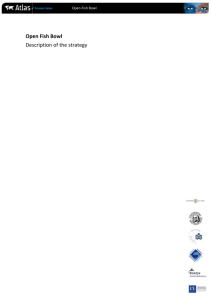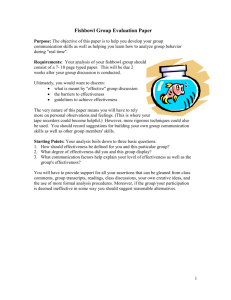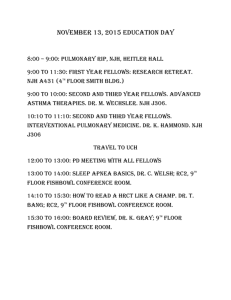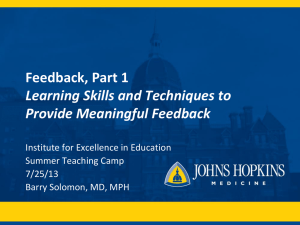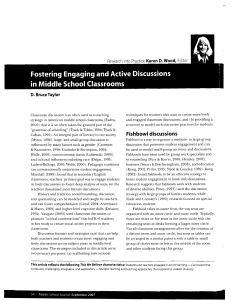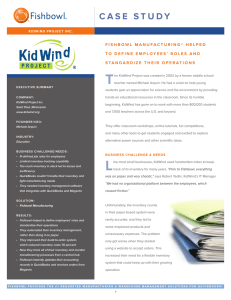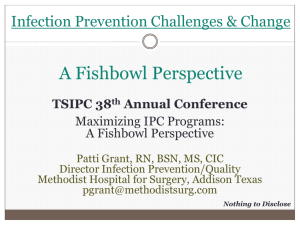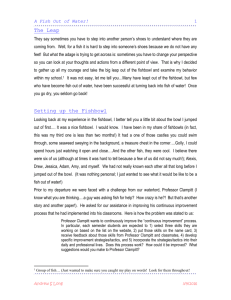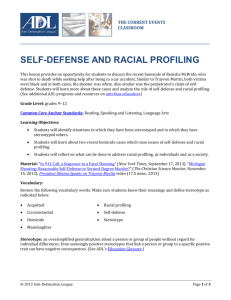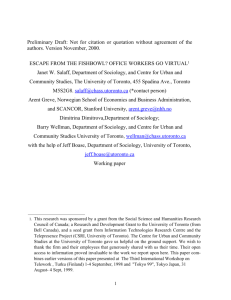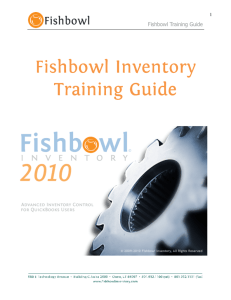PAD 6417: Public Personnel Administration
advertisement
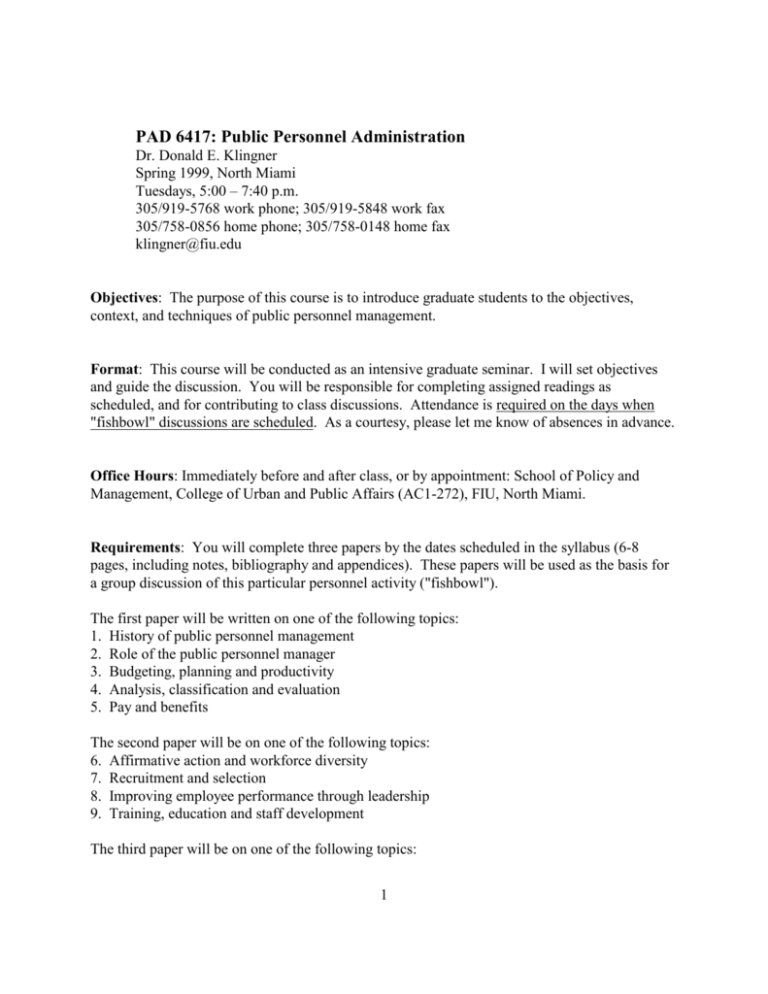
PAD 6417: Public Personnel Administration Dr. Donald E. Klingner Spring 1999, North Miami Tuesdays, 5:00 – 7:40 p.m. 305/919-5768 work phone; 305/919-5848 work fax 305/758-0856 home phone; 305/758-0148 home fax klingner@fiu.edu Objectives: The purpose of this course is to introduce graduate students to the objectives, context, and techniques of public personnel management. Format: This course will be conducted as an intensive graduate seminar. I will set objectives and guide the discussion. You will be responsible for completing assigned readings as scheduled, and for contributing to class discussions. Attendance is required on the days when "fishbowl" discussions are scheduled. As a courtesy, please let me know of absences in advance. Office Hours: Immediately before and after class, or by appointment: School of Policy and Management, College of Urban and Public Affairs (AC1-272), FIU, North Miami. Requirements: You will complete three papers by the dates scheduled in the syllabus (6-8 pages, including notes, bibliography and appendices). These papers will be used as the basis for a group discussion of this particular personnel activity ("fishbowl"). The first paper will be written on one of the following topics: 1. History of public personnel management 2. Role of the public personnel manager 3. Budgeting, planning and productivity 4. Analysis, classification and evaluation 5. Pay and benefits The second paper will be on one of the following topics: 6. Affirmative action and workforce diversity 7. Recruitment and selection 8. Improving employee performance through leadership 9. Training, education and staff development The third paper will be on one of the following topics: 1 10. 11. 12. 13. 14. Performance appraisal Employee health and safety Employee rights and responsibilities Collective bargaining Strategic human resource management capability Each of these papers will be either a research paper, which analyzes concepts or techniques in an area, or a case study, which analyzes the effectiveness of a particular organization's handling of an activity. This will usually be a current or previous employer, since first-hand knowledge of the organization usually is necessary to discuss the feasibility of proposed solutions, and means of overcoming implementation problems. If you choose to do a case study, be sure it includes the following information: 1. Define the problem or situation (20% of your grade) 2. Propose a solution (10%) 3. Tell what problems you would be likely to encounter in implementing your proposed solution, and how you would overcome them (70%) 4. Include a reference list of all sources (Internet sites, interviews, government documents, books, and articles). Book: Donald Klingner and John Nalbandian, Public Personnel Management: Contexts and Strategies (Englewood Cliffs, NJ: Prentice-Hall, 4th edition, 1998). Grades: Each paper will be worth 25% of your course grade. Participation in class and "fishbowl" discussions will be worth 25%. Late papers will be penalized one letter grade, unless permission is granted in advance. Papers will be evaluated according to the following criteria: - For a grade of C, I expect that papers will repeat existing knowledge from lectures and assigned readings, and include notes and bibliography following some accepted format. - For a grade of B, I expect that the requirements for a grade of C will be met, and in addition that the paper will advance a coherent line of argument based on lectures, assigned and optional reading. - For a grade of A, I expect that the requirements for a grade of B will be met, and in addition, the paper will combine your own insights with those of relevant scholarly literature to demonstrate a view of the subject that is both personal and based on an understanding of relevant theory and concepts. I will review good quality first drafts of any paper given to me at least one week prior to the due date. "Good quality" means that you have written the analysis and conclusions, and include a 2 reference list. I will give you my comments on the paper over the phone so that you may, if you wish, revise and improve it. The final copy is the one I will grade. "Fishbowl": 25% of your course grade is based on performance in the three fishbowls, and in other class discussions. "Fishbowls" are a guided group discussion technique. Two concentric circles of chairs are arranged. Those students presenting papers on one particular topic sit in the inner circle; other persons sit in the outer circle. "Fishbowl" members (those in the inner circle) are responsible for using a block of time to define their topic, discuss related concepts and problems, and summarize the discussion. Those outside are responsible for listing, and for contributing to the discussion by suggesting topics, which the fishbowl has neglected, for asking relevant questions, or contributing information. To talk, outsiders must move to one of the empty chairs in the inner circle. The success of fishbowls depends on shared responsibility for directing the discussion; keeping comments short, relevant and well documented; drawing everyone into the discussion; and allowing time for a summary. Course Schedule Date Topic and Required Reading January 5, 1999 Part I: Introduction The World of Public Personnel Management Read: K&N, ch. 1. January 12, 1999 Role of the public personnel manager Read: K&N, ch. 2. Library Tour January 19 Part II: Planning Budgeting, Planning and Productivity Read: K&N, ch. 3. Analysis, Classification and Evaluation Read: K&N, ch. 4. January 26 Pay and Benefits Read: K&N, ch. 5. 3 February 2 Fishbowl #1 All first papers are due February 9 Part III: Acquisition Affirmative Action & Workforce Diversity Read: K&N, ch. 6 Recruitment, Selection, Promotion Read: K&N, ch. 7. February 16 Part IV: Development Improving Employee Performance through Leadership Read: K&N, ch. 8. February 23 Training, Education & Staff Development Read: K&N, ch. 9. March 2 Fishbowl #2 All second papers are due March 9 Performance Appraisal Read: K&N, ch. 10. March 16 Employee Health and Safety Read: K&N, ch. 11. March 23 FIU Spring Break – no class March 30 Part V: Sanctions Employee Rights and Responsibilities Read: K&N, ch 12. 4 April 6 Collective Bargaining Read: K&N, ch. 13. Strategic Human Resource Management Read: K&N, ch. 14. April 13 Fishbowl #3 All third papers are due Course Evaluation 5
